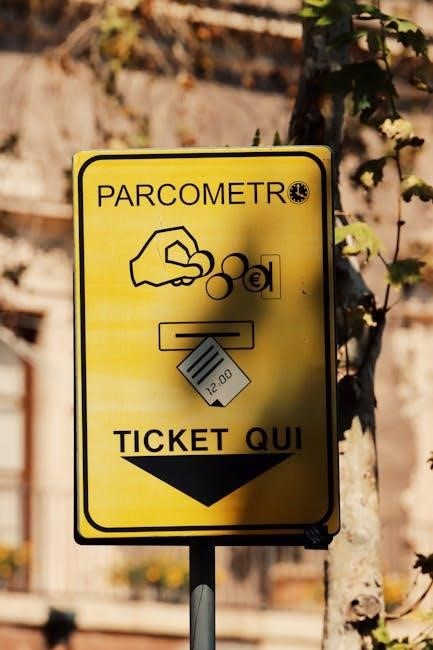The 2024 examination instructions provide a comprehensive guide for conducting exams, ensuring fairness, security, and compliance with JCQ regulations. They outline roles, responsibilities, and key procedures.
1.1 Overview of the Examination Process
The 2024 examination process involves a structured system to ensure fairness and integrity. It includes preparation, conduct, and post-examination procedures, guided by JCQ regulations. Key stages encompass candidate registration, material distribution, invigilation, and result submission. Special considerations, such as COVID-19 safety measures and accommodations for special needs, are highlighted to ensure inclusivity and safety. The process emphasizes clear communication and adherence to timelines for all stakeholders involved.
1.2 Purpose and Scope of the Instructions
The purpose of the 2024 examination instructions is to provide clear guidelines for conducting fair, secure, and efficient exams. The scope covers all stages, from preparation to post-examination procedures, ensuring compliance with JCQ regulations. These instructions are designed for examination centers, invigilators, and candidates, offering detailed protocols for various scenarios, including special needs accommodations and emergency situations, to maintain exam integrity and consistency across all levels.
Key Dates and Timelines for 2024 Examinations
Examinations are scheduled between September 1, 2024, and August 31, 2025. Key dates include registration deadlines, exam periods, and submission timelines for accurate planning and execution.
2.1 Exam Schedules and Deadlines
Exam schedules for 2024 are meticulously planned, with specific timelines for each subject and paper. Deadlines for candidate registration, submission of materials, and exam administration are clearly outlined to ensure smooth execution. Centres must adhere strictly to these dates to maintain the integrity of the examination process and avoid any potential disruptions or penalties.
2.2 Registration and Submission Dates
Registration and submission dates for 2024 exams are critical to ensure timely preparation. Centres must submit candidate entries by the specified deadlines, typically several months in advance. Late submissions incur penalties, and missing deadlines may result in exclusion from the exam cycle. Clear timelines are provided in the JCQ guidelines, ensuring all stakeholders adhere to the required schedules for smooth examination administration.
Preparing for the Examination
Preparing for the 2024 exams involves gathering required materials, ensuring candidate eligibility, and following JCQ guidelines to maintain exam integrity and fairness for all participants.
3.1 Required Materials and Equipment
Essential materials include examination papers, answer sheets, stationery, and calculators. Candidates must bring valid ID and any specified tools. Digital devices, except approved calculators, are prohibited.
Invigilators must ensure all equipment is checked and functioning. Sealed question paper packets and secure distribution processes are mandatory to maintain exam integrity and prevent breaches.
3.2 Candidate Preparation and Eligibility
Candidates must meet specific eligibility criteria, including completing required coursework and adhering to registration deadlines. They are responsible for bringing valid identification and ensuring they understand exam rules and regulations.
Preparation includes reviewing syllabi, practicing past papers, and familiarizing themselves with exam formats. Candidates must avoid prohibited items and ensure all materials comply with JCQ guidelines to maintain exam integrity.

Exam Room Accommodation and Setup
The exam room must be set up to ensure fair conditions, with appropriate seating, clear supervision, and necessary materials. Invigilators are responsible for maintaining order and security.
4.1 Seating Arrangements and Layout
Exam rooms must have seating arranged to prevent candidate collaboration, with clear visibility for invigilators. Desks should be spaced appropriately, and candidates must face forward. Special needs accommodations, such as adaptive furniture or assistive technology, must be provided as specified. The layout ensures fair conditions, minimizing distractions and maintaining exam integrity. Invigilators are responsible for enforcing these arrangements strictly.
4.2 Invigilation and Supervision
Invigilators are responsible for ensuring exam integrity by monitoring candidates, distributing materials, and addressing disruptions. They must maintain a fair environment, prevent cheating, and handle emergencies. Supervisors oversee invigilators, ensuring JCQ guidelines are followed. Invigilators must be trained to manage irregularities, such as late arrivals or misconduct, and report incidents promptly. Their role is critical to maintaining the security and fairness of the examination process.

Conducting the Examination
This section outlines the procedures for starting the exam, distributing materials, and managing candidate behavior. It ensures a smooth and fair examination process for all candidates.
5.1 Starting the Exam and Distribution of Materials
Invigilators must ensure all materials are distributed accurately. Candidates should confirm their details on the papers. A clear start time is announced, and late arrivals are managed according to guidelines. Materials are handed out efficiently to maintain order and ensure the exam begins promptly without delays or disruptions to candidates.
5.2 Managing Candidate Behavior and Irregularities
Invigilators must monitor candidate behavior to ensure a fair environment. Any disruptions, misconduct, or irregularities should be addressed promptly. Procedures include documenting incidents, separating candidates if necessary, and reporting violations to the appropriate authorities. Invigilators are trained to handle such situations discreetly while maintaining exam integrity and ensuring compliance with JCQ guidelines.
Handling Late Candidates and Emergencies
Procedures for late arrivals and emergency situations are outlined to ensure minimal disruption. Candidates arriving late may be permitted to sit, but this is subject to strict guidelines.
6.1 Procedures for Late Arrivals
Candidates arriving late must report to the exam supervisor immediately. Those arriving within 30 minutes may be allowed to sit, but reading time will not be extended. Latecomers beyond this period may be denied entry. A valid reason must be provided, and the invigilator will escort late candidates to their seat to minimize disruption. No additional time will be granted, and penalties may apply for extreme tardiness.
6.2 Emergency Protocols During the Exam
In case of an emergency, the exam must be paused immediately. Invigilators will ensure candidate safety, evacuate the room if necessary, and contact emergency services. A record of the incident will be made, and the exam may resume once safety is confirmed. Candidates will not be penalized for time lost due to unforeseen circumstances. All incidents must be documented and reported to the exam board promptly for further guidance.
Post-Examination Procedures
After the exam, materials are secured, and scripts are collected for submission. Results are processed, and feedback is provided to candidates. All procedures ensure accuracy and confidentiality.
7.1 Collecting and Securing Exam Scripts
After the exam concludes, all scripts must be collected and secured immediately. Scripts are organized, counted, and verified for accuracy. Invigilators ensure no materials are missing or tampered with. Scripts are placed in sealed, labeled bags and stored securely to prevent unauthorized access. The process ensures integrity and confidentiality, with scripts submitted promptly to the designated authority for further processing and evaluation.
7.2 Submitting Results and Feedback
Once exam scripts are secured, results are submitted to the designated authority following JCQ guidelines. Feedback is provided to candidates, ensuring clarity on performance. The process maintains confidentiality and accuracy, adhering to JCQ standards for reliability and fairness.
Special Considerations for 2024 Exams
This section outlines the special considerations for the 2024 exams, including COVID-19 safety measures and accommodations for special needs candidates.
8.1 COVID-19 Safety Measures
Examination centers must implement COVID-19 safety measures, including mask-wearing, social distancing, and hand sanitizer availability. Candidates with symptoms should follow isolation protocols, and emergency procedures are in place for positive cases. Ventilation and hygiene practices are emphasized to ensure a safe environment. These measures align with public health guidelines and are subject to updates based on evolving pandemic conditions.
8.2 Accommodations for Special Needs Candidates
Examination centers must provide accommodations for candidates with special needs, such as extra time, scribes, or adaptive technology, as per JCQ guidelines. Access arrangements should be agreed upon in advance, ensuring equity and inclusion. These accommodations are tailored to individual needs, fostering a fair environment for all candidates to demonstrate their abilities effectively during the examination process.

Role of Invigilators and Supervisors
Invigilators and supervisors ensure exams are conducted fairly, maintaining integrity and adherence to JCQ guidelines. They manage candidate behavior, handle emergencies, and uphold exam rules rigorously.
9.1 Responsibilities and Duties
Invigilators and supervisors are responsible for ensuring exams run smoothly, maintaining security, and upholding JCQ guidelines. Duties include supervising candidates, managing irregularities, handling emergencies, and ensuring a fair environment. They must remain vigilant, enforce rules, and maintain confidentiality to safeguard the integrity of the examination process.
9.2 Training and Guidelines
Invigilators and supervisors must undergo mandatory training to understand JCQ regulations and exam protocols. Guidelines emphasize maintaining confidentiality, handling irregularities, and supporting special needs candidates. Training covers emergency procedures, seating arrangements, and distribution of materials. Adherence to these guidelines ensures consistency and fairness in the examination process.
JCQ Guidelines and Regulations
JCQ guidelines ensure exams are conducted fairly and consistently. They cover confidentiality, security, and emergency protocols, providing a framework for maintaining exam integrity and candidate welfare.
10.1 Joint Council for Qualifications (JCQ) Requirements
The JCQ requirements outline specific standards for exam administration. These include maintaining confidentiality, securing exam materials, and ensuring accessibility for all candidates. Compliance with these regulations is mandatory to uphold the integrity of the examination process and ensure fairness for all participants. Centers must adhere strictly to these guidelines to avoid any potential penalties or discrepancies.
10.2 Compliance and Reporting
Compliance with JCQ regulations is essential for maintaining exam integrity. Centers must submit reports detailing adherence to guidelines, including any irregularities. Regular audits ensure accountability, and failure to comply may result in penalties. Timely reporting of issues ensures transparency and fairness in the examination process.
Non-Examination Assessments (NEA)
NEAs are assessments not conducted under exam conditions, focusing on coursework and practical tasks. They require clear guidelines to ensure fairness and academic integrity across all subjects.
11.1 Instructions for Conducting NEA
NEA instructions emphasize clear guidelines for coursework and practical tasks, ensuring authenticity and fairness. Teachers must outline expectations, deadlines, and submission processes. Students should understand the requirements for original work and proper citation. Supervisors must monitor progress, provide feedback, and ensure tasks align with assessment criteria. Detailed records of student work and progress should be maintained. Resources and support materials are available for centers to facilitate effective NEA management.
11.2 Submission and Moderation Processes
NEA submissions require strict adherence to deadlines and formatting guidelines. Centers must ensure all work is authenticated and properly anonymized before submission. Moderation processes involve external examiners reviewing samples to ensure consistency and fairness. Feedback from moderators is used to standardize grading and maintain exam integrity. Detailed documentation and secure electronic submissions are mandatory to prevent errors or discrepancies.

Useful Links and Resources
Access official documentation, including the Instructions for Conducting Examinations 2024-2025 PDF. Find JCQ guidelines, NEA instructions, and contact support at JCQ Support.
12.1 Official Documentation and Downloads
Access the Instructions for Conducting Examinations 2024-2025 PDF, which includes detailed guidelines for exam administration. Download the JCQ Requirements document for compliance. Obtain the NEA Instructions 2024-25 PDF for non-examination assessments. Visit the official JCQ Website for additional resources and updates.
12.2 Contact Information for Support
For assistance, contact the JCQ support team at 01244 470134. Visit the JCQ Official Website for resources and updates. Direct inquiries to JCQ Contact Page for exam-related questions. Ensure compliance by reaching out to the designated support channels for timely guidance.
The 2024 examination instructions provide a detailed framework for conducting fair and secure assessments. By adhering to these guidelines, exam centers ensure compliance with JCQ regulations and maintain academic integrity. Candidates, invigilators, and institutions are encouraged to prepare thoroughly and follow the outlined procedures. This comprehensive guide supports the smooth execution of examinations, fostering a conducive environment for all participants. Thank you for your attention to these critical instructions.
